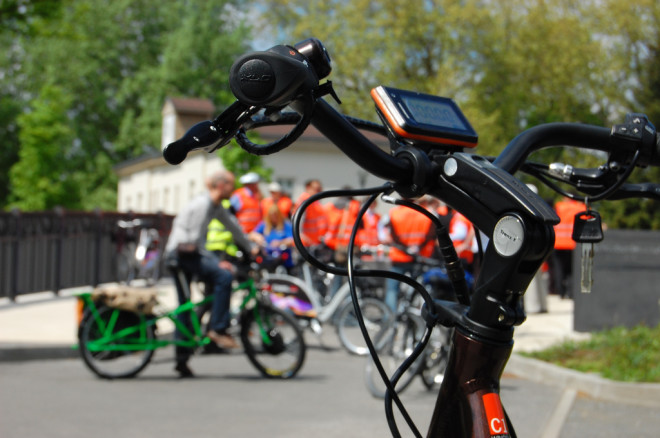
EU Launches Horizon 2020, the World’s Biggest Ever Open Research Budget; What's in it for Cycling?
On 10th December, the European Union launched Horizon 2020. Described as the biggest research and innovation programme in the world, it has an eye-watering budget of nearly €80 billion over 7 years (2014 to 2020), in addition to the private investment that this money will attract. It promises more breakthroughs, discoveries and world-firsts by taking great ideas from the lab to the market.
The research budget was the only one to increase in the new EU funding round, mainly because the EU overtly linked the research agenda to recovery, jobs and international competitiveness. Horizon 2020 has a stronger emphasis on industrial competitiveness and promises greater support for industry than its predecessor. At least €17 billion are reserved for industrial leadership including Small and Medium Enterprises (SMEs).
In the cycling world it is very clear that all our communities need to be familiar with what Horizon 2020 has to offer, from research fellowships for individuals up to billions for innovation in industry and cities. In this report, ECF picks out some of the opportunities with a particular emphasis on the first €15 billion of calls for proposals that the EU Commission has announced this week.
With its focus on industrial leadership, Horizon 2020 is of particular interest to the bike industry. Kevin Mayne, ECF’s Director of Development gave an interview for the November issue of Bike Europe magazine about why the cycling industry should be engaging in the EU’s new technology agenda. You can read the full article here (free registration required).
The headlines
The proposed support for research and innovation under Horizon 2020 will:
- Provide a budget of € 24 billion to boost to top-level research in Europe
- Strengthen industrial leadership in innovation with € 17 billion of funding. This funding stream includes major investment in key technologies, greater access to capital and support for SMEs. It may be a key finding area for the bicycle industry and allied industries.
- Invest € 31 billion to help address major concerns shared by all Europeans such as climate change, developing sustainable transport and mobility, making renewable energy affordable or ensuring food safety and security. Here the transport calls may be of most interest to cycling.
First calls under these headings have been published and the earliest closing dates will be March 2014.
Industrial leadership: millions for Green vehicles & SMEs
Two important threads can be found under this heading.
The first area is the €143 million first phase of the European Green Vehicles Initiative, a successor to the Green Cars Initiative that is now open to support vehicles in all categories – except bicycles! Yet it is still important for the bike industry because of the increasing overlap between technologies that emerge with the e-bike, cargo-bike and light electric vehicle sector. The initiative is essentially aimed at building energy efficiency and electrification into every section of the powered vehicle sector including an invitation to research “radical” new light vehicles that fit somewhere around the bicycle/e-bike sector in terms of use. The legal and regulatory issues can also be researched.
Why might the bike industry be involved?
- Because our industry knows more about light-weight electric vehicles than any other sector and has shown itself to have considerable innovation potential and skill.
- Because two of the key research areas are to develop the next revolution in performance for Lithium-ion (Li-ion) batteries and to look at the long term replacement for Li-ion. Working with battery makers and academics to leap Europe ahead in technical capacity in this area could be a big opportunity for bike component companies, not just car makers.
The second industry area is the support for Small and Medium Businesses. This comes in the form of dedicated initiatives and insistence that SMEs are included in most of the work areas. So if you are a small business with an innovation that solves some of society’s challenges you could be looking to the EU for support.
€274 million for Smart, Green and Integrated Transport
What’s in Horizon 2020 for cycling as Mobility for Growth?
The road safety calls “Traffic safety analysis and integrated approach towards the safety of Vulnerable Road Users”, “ITS for safe, congestion-free and sustainable mobility”, and “Safe and connected automation in road transport” already have a number of consortia exploring possible actions. Why not think about a new generation of rail vehicles that integrate with cycle carriage?
However, the priority area for cycling looks like Urban Mobility which includes work branded under the CIVITAS initiative. This initiative has been an important funding stream for transport innovation in cities.
This round of research will include “Transforming the use of conventionally fuelled vehicles in urban areas”, “Reducing impacts and costs of freight and service trips in urban areas”, “Tackling urban road congestion” and “Strengthening the knowledge and capacities of local authorities”.
The urban road congestion work area specifically mentions shifting to cycling and walking. Therefore it is good to see that the EU is recognising mode shift as a solution to change instead of throwing all its energies at alternative fuels and ITS. This has been a key call of ECF’s advocacy in recent years and we are pleased to see it recognised.
The Intelligent Transport Systems programme is considered so important by the EU that it will have its own launch and information day, although it is part of Horizon 2020.
Integration & Innovation for Smart cities: keywords that will get you the funding
The SMART Cities programme as part of Horizon 2020 will certainly be a big funding opportunity for urban mobility projects and the related industries. SMART cities also includes a lot of initiatives on energy and connectivity besides mobility.
According to the Smart Citiers Stakeholder Platform and the European Regions Research and Innovation Network (ERRIN), an important keyword to get funding from the SMART Cities programme is integration. The project applications should show integration of Urban Energy Production and Use, Urban Information and Communication Technology and Urban Transport and Mobility.
This means that cycling might have increased chances to be part of projects in comparison to Horizon 2020's predecessor programmes. The three key words are: innovate, integrate, replicate! Projects should be embedded in urban plans, should have follower cities and real commitment of partners and financial viability. Therefore innovation is another important keyword.
Horizon 2020 links and resources
The Horizon 2020 portal
http://ec.europa.eu/programmes/horizon2020/
Research fellowships
http://ec.europa.eu/research/mariecurieactions/index_en.htm
Health and demographic change
There is a live stream from a special event in Brussels on Transport research under Horizon 2020 on December 18th:
http://ec.europa.eu/research/transport/events/infoday2013/index_en.htm
The strategy and an outline of all the possible work programmes under the €6billion funding for transport in Horizon 2020 can be found here:
http://ec.europa.eu/programmes/horizon2020/en/h2020-section/smart-green-and-integrated-transport
Find out more
The language and processes can look daunting to start with, but there is lots of support available, especially through National Contact Points and various help services. While ECF itself cannot offer a comprehensive advice service, we are happy to discuss more on a confidential basis with possible partners.
ECF is already hearing about some very interesting actions in the areas mentioned in this article. We will follow the development of Horizon 2020 very closely and update our website with links to the EU’s very detailed resources where we can.
About the author

Kevin Mayne is ECF's Development Director. He was Chief Executive of CTC, the UK’s national cyclists’ organisation for 14 years. He was also a member of the Board of Cycling England where he was a specialist on cycle training issues. In both roles he helped create millions of pounds of funding for cycling. He became a Vice President of ECF in 2007 and stood down to join the ECF staff.
- Log in to post comments
Contact the author
Recent news!
Upcoming events
Contact Us
Avenue des Arts, 7-8
Postal address: Rue de la Charité, 22
1210 Brussels, Belgium










